Landscape Gardening in Forest Hill
Introduction to Landscape Gardening
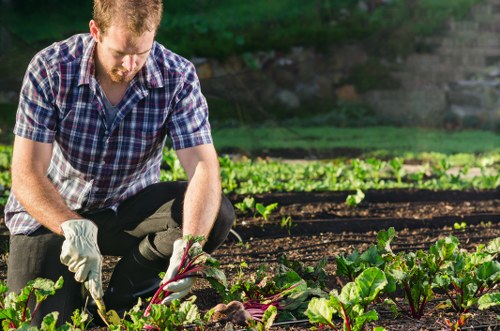
Landscape gardening in Forest Hill is an art that combines creativity, horticultural knowledge, and environmental consciousness to transform outdoor spaces into stunning and functional areas. Whether you're looking to redesign your backyard, create a welcoming front garden, or enhance your commercial property's outdoor appeal, landscape gardening offers endless possibilities.
Forest Hill's unique climate and soil conditions provide a perfect backdrop for a variety of plants and garden designs. By understanding the local environment and selecting appropriate plants and materials, you can create a sustainable and beautiful landscape that thrives year-round.
Engaging in landscape gardening not only enhances the aesthetic appeal of your property but also contributes to environmental sustainability by promoting biodiversity, reducing carbon footprints, and improving air quality.
Benefits of Landscape Gardening

Investing in landscape gardening in Forest Hill brings numerous benefits that extend beyond visual appeal. Here are some key advantages:
- Enhanced Property Value: A well-designed landscape can significantly increase the market value of your property.
- Improved Mental Health: Green spaces have been shown to reduce stress and promote mental well-being.
- Environmental Sustainability: Proper landscaping can contribute to water conservation, soil preservation, and habitat creation.
- Energy Efficiency: Strategically placed trees and shrubs can provide natural insulation, reducing the need for artificial heating and cooling.
- Aesthetic Appeal: A beautifully landscaped garden creates a welcoming and attractive environment for homeowners and visitors alike.
Choosing the Right Plants for Forest Hill

Selecting the appropriate plants is crucial for the success of your landscape garden. Forest Hill's temperate climate supports a wide range of plant species, but it's essential to consider factors such as sunlight, soil type, and water availability when making your choices.
Native Plants: Incorporating native plants is highly recommended as they are well-adapted to the local climate and require less maintenance. Examples include:
- Blue Fescue – a hardy ornamental grass perfect for borders and containers.
- Hydrangeas – providing vibrant blooms throughout the seasons.
- Hostas – ideal for shaded areas, offering lush foliage.
Using a mix of evergreen and deciduous plants ensures year-round interest and structural diversity in your garden.
Designing Your Garden Layout

A well-thought-out garden layout is the foundation of successful landscape gardening. Start by assessing the space available and determining the primary functions of your garden. Common layout designs include:
- Formal Gardens: Characterized by symmetry, geometric shapes, and structured plantings.
- Informal Gardens: Emphasize natural growth patterns, with curvilinear paths and mixed plantings.
- Zen Gardens: Focus on minimalism, using rocks, gravel, and carefully placed plants to create a serene environment.
- Container Gardens: Utilize pots and planters to create flexible and portable garden spaces.
Incorporate elements such as patios, walkways, water features, and seating areas to enhance functionality and aesthetic appeal.
Materials and Hardscaping

Hardscaping elements play a vital role in defining the structure and functionality of your landscape. Common materials used in Forest Hill landscape gardening include:
- Stone: Ideal for pathways, retaining walls, and decorative features.
- Wood: Perfect for building decks, pergolas, and garden furniture.
- Concrete: Used for modern pathways, patios, and outdoor kitchens.
- Metal: Suitable for garden sculptures, fencing, and structural supports.
Choosing the right materials not only enhances the visual appeal but also ensures durability and longevity of your garden structures.
Sustainable Gardening Practices

Adopting sustainable gardening practices is essential for creating an eco-friendly landscape in Forest Hill. Key practices include:
- Composting: Recycling organic waste to enrich soil fertility.
- Water Conservation: Implementing drip irrigation systems and rainwater harvesting to minimize water usage.
- Integrated Pest Management: Using natural pest control methods to reduce reliance on chemicals.
- Mulching: Applying organic mulch to retain soil moisture and prevent weed growth.
- Native Planting: Favoring native species to support local wildlife and reduce maintenance needs.
These practices not only benefit the environment but also lead to a healthier and more resilient garden.
Maintenance Tips for Your Garden
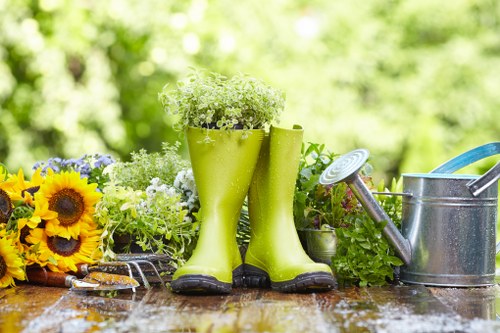
Proper maintenance is crucial to ensure that your landscape garden remains beautiful and healthy throughout the year. Here are some essential maintenance tips:
- Regular Pruning: Trim plants to encourage growth and remove dead or diseased branches.
- Weeding: Keep your garden free of invasive weeds that can compete with your plants for nutrients and water.
- Soil Health: Test and amend soil as needed to maintain optimal nutrient levels and pH balance.
- Watering: Provide adequate water during dry periods, ensuring that plants receive consistent moisture without overwatering.
- Fertilization: Apply fertilizers based on plant needs to promote healthy growth and blooming.
Regular maintenance not only enhances the appearance of your garden but also prolongs the lifespan of your plants and landscape features.
Hiring Professional Landscape Gardeners
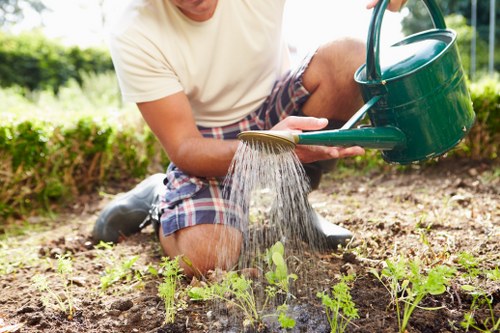
While DIY landscape gardening is possible, hiring professional landscape gardeners in Forest Hill can provide several benefits:
- Expertise: Professionals have the knowledge and experience to design and implement effective garden solutions.
- Time-Saving: Outsourcing gardening tasks allows you to enjoy your outdoor space without the time commitment.
- Access to Resources: Professionals often have access to high-quality materials and plants that may not be readily available to the public.
- Customized Design: Tailored garden designs that reflect your personal style and meet your specific needs.
- Ongoing Maintenance: Many services offer regular maintenance to keep your garden in pristine condition.
Consider reaching out to local landscape gardening experts to discuss your vision and explore the best options for your property.
Seasonal Gardening Tips
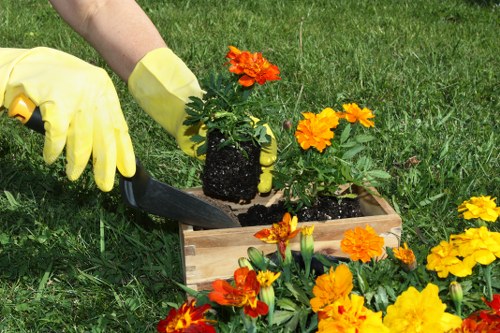
Forest Hill experiences distinct seasons, each bringing unique opportunities and challenges for your garden. Here are some seasonal tips to keep your landscape thriving:
- Spring: Focus on planting new flowers, fertilizing lawns, and preparing garden beds for the growing season.
- Summer: Maintain regular watering schedules, prune overgrown plants, and manage pests effectively.
- Autumn: Clear fallen leaves, plant bulbs for spring blooms, and prepare plants for winter.
- Winter: Protect sensitive plants from frost, plan garden designs for the upcoming year, and perform necessary maintenance on garden tools and equipment.
Adapting your gardening practices to the changing seasons ensures a resilient and vibrant landscape all year long.
Tools and Equipment for Landscape Gardening
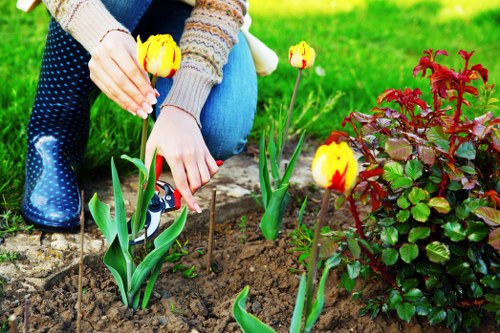
Having the right tools and equipment is essential for effective landscape gardening. Here are some must-have items for your Garden toolkit:
- Pruning Shears: For trimming and shaping plants with precision.
- Garden Fork: Ideal for aerating soil and removing weeds.
- Lawn Mower: Keeps your grass neatly trimmed and maintained.
- Watering System: Efficient irrigation systems like drip or sprinkler setups ensure consistent watering.
- Rakes and Shovels: Essential for debris removal and soil preparation.
Investing in quality tools not only makes gardening tasks easier but also enhances the overall health and appearance of your landscape.
Incorporating Hardscape Features
[IMG_11]Hardscape features add structure and functionality to your landscape garden. Popular hardscape elements include:
- Patios: Provide a space for outdoor dining and relaxation.
- Walkways: Guide visitors through your garden and connect different areas.
- Retaining Walls: Help manage slopes and prevent soil erosion.
- Water Features: Add tranquility and visual interest with fountains, ponds, or streams.
- Outdoor Lighting: Enhances safety and showcases your garden's beauty at night.
Carefully selected and strategically placed hardscape features can transform your garden into a cohesive and inviting outdoor space.
Plant Maintenance and Care
[IMG_12]Proper plant care is essential for maintaining a healthy and vibrant landscape garden. Key aspects include:
- Watering: Ensure that plants receive adequate water, especially during dry spells.
- Fertilizing: Provide necessary nutrients to support growth and flowering.
- Pest Control: Monitor for pests and use eco-friendly methods to manage infestations.
- Pruning: Regularly trim plants to promote healthy growth and remove dead or diseased parts.
- Mulching: Apply mulch to retain moisture, regulate soil temperature, and suppress weeds.
Consistent maintenance ensures that your plants remain healthy and your garden continues to flourish.
Creating Outdoor Living Spaces
[IMG_13]Transforming your garden into an outdoor living space enhances your enjoyment and increases the functionality of your property. Consider the following elements:
- Seating Areas: Comfortable benches, chairs, and sofas create inviting spaces for relaxation and socializing.
- Outdoor Kitchens: Equip your garden with cooking facilities for entertaining and dining al fresco.
- Fire Pits: Provide warmth and a focal point for gatherings during cooler evenings.
- Shade Structures: Pergolas, umbrellas, and awnings offer protection from the sun while adding aesthetic appeal.
- Entertainment Systems: Outdoor speakers and lighting enhance the ambiance and functionality of your space.
Designing outdoor living areas tailored to your lifestyle can significantly enhance your overall garden experience.
Eco-Friendly Gardening Practices
[IMG_14]Embracing eco-friendly gardening practices contributes to a healthier environment and a more sustainable landscape. Key practices include:
- Rainwater Harvesting: Collect and utilize rainwater for irrigation to reduce dependency on municipal water sources.
- Solar Lighting: Use solar-powered lights to minimize energy consumption.
- Composting: Turn kitchen and garden waste into valuable compost for enriching soil.
- Organic Gardening: Use organic fertilizers and pest control methods to maintain soil and plant health naturally.
- Native and Drought-Resistant Plants: Select plants that require minimal water and are adapted to the local climate.
Implementing these practices not only benefits the environment but also creates a resilient and low-maintenance garden.
Seasonal Planting Strategies
[IMG_15]Effective seasonal planting can ensure that your landscape garden remains vibrant throughout the year. Consider the following strategies:
- Spring Planting: Focus on planting annuals, bulbs, and perennials that bloom in the warmer months.
- Summer Maintenance: Provide adequate water and shade for vulnerable plants during the hottest months.
- Autumn Preparation: Plant hardy shrubs and trees, and prepare perennials for winter by cutting back and protecting them.
- Winter Gardening: Utilize evergreen plants and install protective coverings for sensitive species.
Strategic planting and maintenance based on seasonal changes ensure a lush and colorful garden all year long.
Incorporating Technology in Landscape Gardening
[IMG_16]Modern technology can significantly enhance your landscape gardening experience. Innovations include:
- Smart Irrigation Systems: Automated watering systems that adjust based on weather conditions and soil moisture levels.
- Landscape Design Software: Tools that allow you to visualize and plan your garden layout digitally.
- LED Lighting: Energy-efficient lighting options that provide illumination and highlight garden features.
- Drones: Used for aerial photography and monitoring the health of large gardens or properties.
- Gardening Apps: Mobile applications that offer gardening tips, plant identification, and maintenance reminders.
Integrating technology into your gardening practices can improve efficiency, accuracy, and overall garden management.
Planning Your Garden Budget
[IMG_17]Creating a beautiful landscape garden requires careful budgeting to ensure that all aspects are adequately funded. Consider the following tips when planning your garden budget:
- Determine Your Priorities: Identify which elements are most important to you, such as plant selection, hardscape features, or water systems.
- Get Multiple Quotes: When hiring professionals, obtain several quotes to compare prices and services.
- Allocate Funds Wisely: Distribute your budget across different garden components, ensuring that high-impact areas receive adequate investment.
- Plan for Maintenance Costs: Include ongoing maintenance expenses in your budget to keep your garden in top condition.
- Be Flexible: Allow for unexpected expenses by setting aside a contingency fund.
Proper budgeting ensures that your landscape gardening project remains on track and achieves the desired results without financial strain.
Maximizing Small Garden Spaces
[IMG_18]Even with limited space, you can create a stunning landscape garden in Forest Hill. Here are some strategies for maximizing small garden areas:
- Vertical Gardening: Utilize vertical space with trellises, green walls, and hanging plants.
- Container Gardening: Grow plants in pots, planters, and raised beds to save space and add visual interest.
- MULTI-PURPOSE Features: Incorporate elements that serve multiple functions, such as benches with built-in storage.
- Smart Plant Selection: Choose compact and versatile plants that thrive in small spaces.
- Efficient Layout: Design your garden layout to maximize usability and aesthetic appeal without overcrowding.
With thoughtful planning and creative design, small garden spaces can be transformed into beautiful and functional outdoor retreats.
Enhancing Garden Privacy
[IMG_19]Creating a sense of privacy in your landscape garden allows you to enjoy your outdoor space without unwanted interruptions. Here are some ways to enhance garden privacy:
- Planting Shrubs and Hedges: Use dense shrubs and hedges to create natural barriers.
- Installing Fencing: Choose from a variety of fencing materials and styles to suit your garden's aesthetic.
- Using Screens and Trellises: These structures offer both privacy and opportunities for climbing plants.
- Strategic Layout: Position garden elements to block views from neighboring properties.
- Incorporating Trees: Tall trees can serve as effective privacy screens while adding beauty to your garden.
Implementing these strategies can create a secluded and tranquil garden environment.
Lighting Your Garden
[IMG_20]Proper lighting enhances the beauty and functionality of your landscape garden, especially during the evening hours. Consider the following lighting options:
- Pathway Lighting: Illuminates walkways and ensures safety while adding a welcoming ambiance.
- Spotlights: Highlight key garden features such as sculptures, trees, or water elements.
- String Lights: Create a cozy and festive atmosphere in seating areas and pergolas.
- Solar Lights: Eco-friendly and energy-efficient options that are easy to install.
- Accent Lighting: Adds depth and dimension to your garden by emphasizing textures and colors.
Thoughtful lighting design not only enhances the visual appeal of your garden but also extends its usability into the night.
Winterizing Your Garden
[IMG_21]Preparing your landscape garden for winter ensures that your plants and structures remain protected during the colder months. Here are some winterizing tips:
- Protecting Plants: Cover sensitive plants with burlap or frost cloth to shield them from harsh weather.
- Mulching: Apply a thick layer of mulch to insulate plant roots and retain soil moisture.
- Pruning: Remove dead or diseased branches to prevent damage from snow and ice.
- Cleaning Hardscapes: Clear debris from patios, walkways, and other structures to prevent mold and deterioration.
- Storing Tools: Properly clean and store gardening tools to extend their lifespan.
Winterizing your garden not only protects your investment but also sets the stage for a vibrant and thriving landscape come spring.
Conclusion
[IMG_22]Landscape gardening in Forest Hill offers a unique opportunity to create a personalized and sustainable outdoor space that enhances your property's beauty and functionality. By carefully selecting plants, incorporating hardscape elements, and adopting eco-friendly practices, you can design a garden that thrives in the local climate and meets your aesthetic preferences.
Whether you're a gardening enthusiast or prefer to hire professional services, investing in landscape gardening can bring lasting benefits, from increased property value to improved mental well-being. Contact us today to start transforming your outdoor space into the garden of your dreams.
Embrace the art of landscape gardening and enjoy a vibrant, sustainable, and beautiful garden in Forest Hill all year round.
